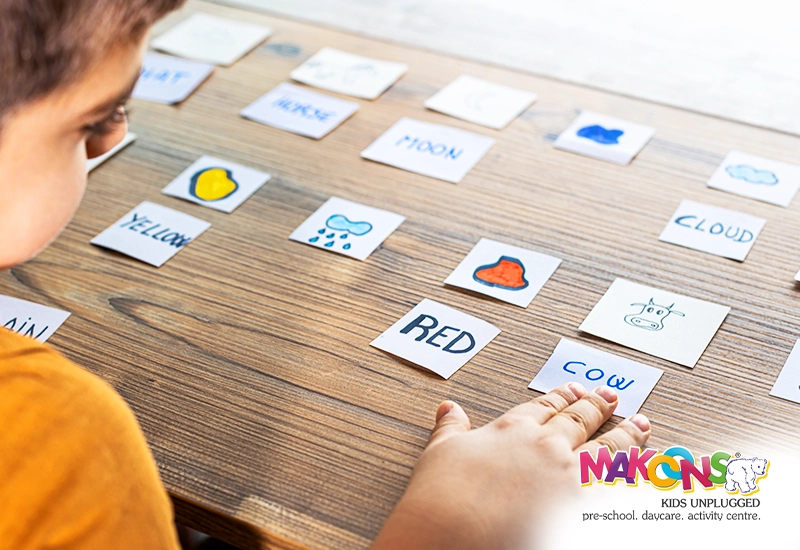Language is the base of all learning. And for toddlers and preschoolers, every word learned by a kid becomes a step towards confident communication, clear thinking, and better emotional expression. But here’s the main and important thing—developing vocabulary doesn’t have to be all about books and flashcards. In fact, most of the effective vocabulary activities for small kids happen right at home, in the middle of day to day life.
Let’s see how you can turn normal routines into some extraordinary opportunities for home learning for small kids, all with empowering their word in fun and most meaningful ways.
Why building Early Vocabulary Matters:
During the first early five years, a child’s brain is just like a sponge. This is because they’re naturally weird species that pick up language through different sounds, multiple repetition, and interaction with each other . A good vocabulary ultimately leads to better listening, sharper thinking, and early reading success. By allowing your child to develop language games and playful moments daily, you’re setting up a strong linguistic foundation for their future life
1. Mean Everything and Talk about everything
The first rule of building vocabulary is just to Talk. A lot. Also Narrate your actions:
“I’m pouring some water into your blue cup” or
Look at the beautiful Porsche outside the window.
The key is to be both descriptive and intentional. Use different and new words, even if your own child doesn’t understand them yet. Repetition and the context will make those words stick in the brain of your child .
Pro Tip: Instead of just saying, “Look at the dog outside,” say “Look at the fluffy brown puppy moving its tail.” More words equals more learning.
2. Read daily aloud
Books are an absolute treasure when it comes to enhancing vocabulary activities for preschoolers and small kids . Your toddler is exposed to new words, sentence structures, and imaginative contexts with the help of storytelling. Repetitive reading helps toddlers recall, and eventually use those words themselves in day to day life .
Choose books which have rich illustrations and rhythm. Ask open-ended questions like these :
What do you think will happen after this?
Why is this cat sad?
These types of prompts encourage storytelling, and critical thinking—while introducing fresh vocabulary on a daily basis .
3. Recite Rhymes and sings songs
Music is rhythmic, repetitive, and packed with different and new words. Music is magic . Whether it’s just classic nursery rhymes or just simple songs for toddlers. Singing improves pronunciation, memory, and listening skills.
Start with the basic songs like “Old MacDonald Had a Farm” or “The Wheels on the Bus.” Add different actions, props, to make it more interactive. These playful chants are powerful language development games
You can also make your own songs with various silly rhymes and insert your child’s name for more giggles and connection.
4. Play Pretend with Purpose
Pretend play is where vocabulary explodes. When your toddler pretends to be a doctor, chef, or teacher, they start using different new words tied to those roles: “thermometer,” “recipe,” “chalkboard.”
You can also set up mini pretend zones at home or maybe at preschool—a toy kitchen, a doctor’s kit. Let your kid lead and take a step forward into the game with them. Model rich vocabulary:
May I have a cup of ice tea, please?
These tiny moment steps in improving the vocabulary of a toddler.
5. Go on a Word Hunt During evening or morning walk
Evening walks, grocery trips, or just a simple ride in the car are perfect chances to add learning for toddlers. You can play an “I Spy” game, but with words. For example:
I spy something round and green—what could it be?
Can you find three things that are soft like plushie
Talk about different textures, multiple colors, shapes. Introduce new words like “bumpy,” “glossy,” or “shiny.” These rich descriptions enhance your child’s expressive toolbox.
6. Create a Word Wall at Home
Designate a small space on a wall, fridge only just to build your kid’s personal word wall. Every different time your kid learns a new word, add it with a picture next to it. Also revisit the wall often and play different games like:
“Find the word that starts with ‘B’”
“touch something you can eat”
7. Use Everyday Routines as Learning Opportunities
Time for Bath, meal , bed are goldmines for vocabulary increment , just Because you are already engaging, so just sprinkle more in richer language.
shower time: “Let’s use this foam on your curly hair .
During meals: “These crunchy cucumbers are so tasty .
bedtime: “Would you like this fluffy blanket or the stripy one?”
Don’t take this power of sensory words and playful tone just for granted. These types of consistent moments create safe spaces for children to explore new words.
8. Encourage both Storytelling and Conversations
Even if your kid is just starting to talk, give them as many chances to express their thoughts. After watching a cartoon ask:
What was your favorite part?
Why do you think the bear was angry?
When kids narrate the story , they pull multiple words from their memory. The more they practice, the better they become at organizing thoughts and expressing them more clearly.
9. Limit Screen Time and Embrace Interactive Play
While most educational shows are useful, nothing can beat direct human interaction with each other . Active engagement
talking, asking questions is what empowers vocabulary. Instead of placing your kid in front of a screen, involve them in some hands-on activities like puzzles, matching games.
Even helping them with simple and easy tasks like mixing dough or sorting clothes can spark word-rich discussions.
10. Celebrate Words whether it is Big and Small
Every time when your child uses a new word, celebrate it ,tight hug. Clap. Smile. Make them feel proud..
You can also make up silly word games at dinner or play “Word of the Day” before bedtime.
Celebration builds confidence in childhood and confidence boosts learning.
Wrapping It Up
Expensive resources or rigid schedules are not really required for helping your child’s vocabulary. Just be patient, and play. Through simple mindful interaction and consistent vocabulary activities for preschoolers your child will naturally absorb, learn and use language in more powerful ways.
So the next time when your kid helps you in the kitchen or plays you’re not just there passing time. You’re shaping a future storyteller, communicator, and great thinker.
Let each and every day be filled with new learning for kids , powered by love, laughter, and lots of words.
Read Also : 15 Easy Drawing Ideas for Kids with Simple Instructions


